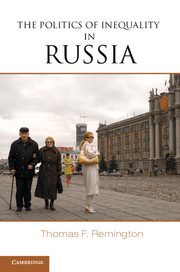Book contents
- Frontmatter
- Contents
- List of Figures
- List of Tables
- Preface
- 1 The Political Sources of Income Inequality in Russia
- 2 Employment, Earnings, and Welfare in the Russian Transition
- 3 Regime Diversity in the Russian Regions
- 4 Democracy and Inequality in the Russian Regions
- 5 Regional Regimes and the Labor Market: Evidence from the NOBUS Survey
- 6 Helping Hands or Grabbing Hands? Government-Business Relations in the Regions
- 7 Accounting for Regime Differences
- 8 After the Crash
- Index
Preface
Published online by Cambridge University Press: 05 June 2012
- Frontmatter
- Contents
- List of Figures
- List of Tables
- Preface
- 1 The Political Sources of Income Inequality in Russia
- 2 Employment, Earnings, and Welfare in the Russian Transition
- 3 Regime Diversity in the Russian Regions
- 4 Democracy and Inequality in the Russian Regions
- 5 Regional Regimes and the Labor Market: Evidence from the NOBUS Survey
- 6 Helping Hands or Grabbing Hands? Government-Business Relations in the Regions
- 7 Accounting for Regime Differences
- 8 After the Crash
- Index
Summary
This study began out of a nagging curiosity about the nature of income inequality in Russia. Why did it rise so sharply after the transition from communism, and why has it stayed so high? Is income inequality in Russia driven by similar forces to those that have been deepening inequality in the United States for the last three decades? What are the effects of democratization on inequality? My initial assumption was that, generally speaking, where democratic political institutions were more effective, inequality would be lower, although whether this was a result of redistribution after market forces had yielded an initial differentiation of earnings, or affected the very structure of earnings, seemed an open question.
I also wanted to understand the three-way interaction among inequality, democracy, and that diffuse, intangible quality of public life that is often termed “governance.” Governance is a multifaceted concept, arguably too diffuse to be treated as a single concept at all. As Daniel Kaufmann and his associates at the World Bank Institute treat it, it is a way of characterizing “the set of traditions and institutions by which authority in a country is exercised.” This is reasonably broad, but the multiple studies of governance carried out by the World Bank Institute team have demonstrated that assessments of the quality of six sets of institutions by which governance is defined tend to be well correlated, and in fact help predict countries' economic performance.
- Type
- Chapter
- Information
- The Politics of Inequality in Russia , pp. xi - xivPublisher: Cambridge University PressPrint publication year: 2011



